| SHADOWS ON THE WALL | REVIEWS | NEWS | FESTIVAL | AWARDS | Q&A | ABOUT | TALKBACK | |||||
 Shadows off the beaten path Shadows off the beaten pathIndies, foreign, docs and shorts...
On this page:
HUDA'S SALON |
THE FAM [La Mif] |
A NIGHT IN THE FIELDS
| |||||
| See also: SHADOWS FILM FESTIVAL | Last update 20.Feb.22 | |||||
|
Huda’s Salon Review by Rich Cline |  MUST
MUST  SEE SEE
| |||||
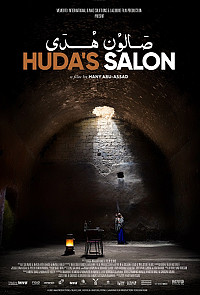 dir-scr Hany Abu-Assad prd Amira Diab, Mohamed Hefzy with Ali Suliman, Maisa Abd Elhadi, Manal Awad, Jalal Masarwa, Omar Abu Amer, Samer Bisharat, Kamel El Basha, Angham Kjalil, Munther Bannoura, Samah Mahmoud, Tamara Abu Laban, Ziad Jarjoura release US 4.Mar.22 21/Palestine 1h31 TORONTO FILM FEST Is it streaming? |
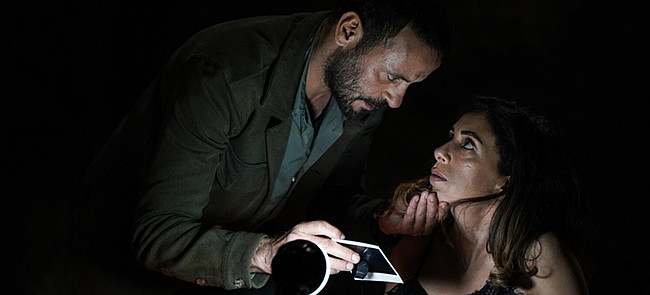 Based on real events, this riveting Palestinian dramatic thriller recounts a story that highlights the dangers that are created when people are walled in. Instantly establishing a complex situation, filmmaker Hany Abu-Assad builds suspense with a series of boldly unnerving sequences. And as the events unfold, the film quietly observes the relentless injustice of everyday life in a city that's been occupied and essentially turned into a prison. In Bethlehem, hairdresser Huda (Awad) entertains her clients with a steady stream of opinionated gossip. She also drugs young new mother Reem (Elhadi), then takes compromising photos with a model (Bisharat) to blackmail her into working for the Israeli secret service. Reem's husband Yousef (Masarwa) is kind but fiercely religious, and he can tell something's wrong. And the Palestinian resistance also notices, bursting into Huda's home and dragging her off to be interrogated by Hassan (Suliman). Meanwhile, Reem is desperately trying to keep out of sight of Hassan's goons. And there's more to everyone's story. Shifting quickly from lightly observational into a darkly violent thriller, this film crackles along. Tension ripples in both plot threads, as Huda brazenly challenges Hassan and Reem quietly battles for her life. The pacing is brisk, and the approach is never fussy, presenting scenes in everyday ways that resonate with underlying themes relating to politics, religion and sexism. Hassan's murderous capabilities are established early on, as is Huda's reluctance as she only preys on women who have notoriously unreasonable husbands. She notes that repression is as deadly as oppression. Suliman and Awad have terrific chemistry as Hassan and Huda challenge and provoke each other, confident in their beliefs and perspectives, refusing to give in even as they begin to understand the other viewpoint. It's fascinating to watch them whittle away at their opposition. Meanwhile, Elhadi has a remarkably breathless presence as the panicky Reem. She finally finds the nerve to stand up to the controlling Yousef, who is played with nuanced confusion by Masarwa as a man taking his own twisty journey. It's shocking to watch Hassan use everything Huda cares about to weaken her defences. And what Reem discovers through her odyssey is deeply chilling, leading to some agonising decisions. Abu-Assad writes and directs this story with unblinking honesty, zeroing in on the sympathetic emotions within each character. This approach makes the film a powerfully vivid, matter-of-fact depiction of life in a place where the only hope for survival is to find someone who still has a glimmer of compassion.
| ||||
|
The Fam La Mif Review by Rich Cline | 
| |||||
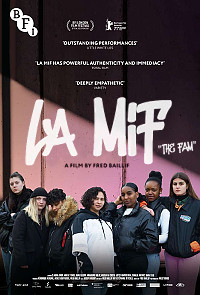 dir-scr Fred Baillif prd Agnes Boutruche, Veronique Vergari with Claudia Grob, Anais Uldry, Kassia Da Costa, Joyce Esther Ndayisenga, Charlie Areddy, Amelie Tonsi, Amandine Golay, Sara Tulu, Nadim Ahmed, Frederic Landenberg, Blaise Granget, Melody Despont Marin release Swi Sep21 zff, UK 28.Jan.22 21/Switzerland 1h50 BERLIN FILM FEST  Is it streaming? |
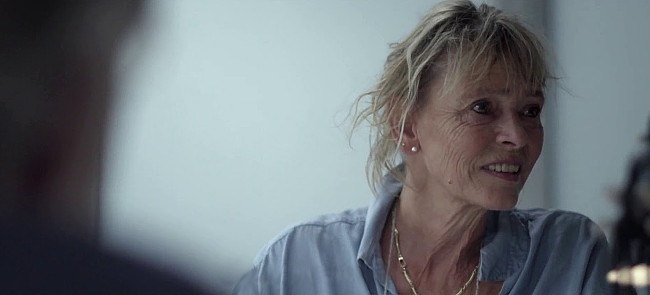 Using a snappy documentary style, filmmaker Fred Baillif takes a powerfully provocative look at the care system, centring on a home for teen girls. Developed over two years with non-professional actors, the film is almost unnervingly realistic, capturing riotous energy and wrenching emotions in a clever combination of scripted and improvised scenes. It's riveting, moving and punchy, the kind of movie that generates important conversations afterwards. In a children's home in Geneva, both the staff and the residents are thrown when 17-year-old Audrey (Uldry) is caught having sex with a 14-year-old boy. The board cracks down on manager Lora (Grob), a veteran who quickly realises that the directors are more concerned with press coverage than the children in their care. And her team (including Ahmed, Landenberg and Granget) have their hands full with these lively teen girls, each of whom has been turned into a hardened survivor by her own distinct circumstances. But they also know how to have fun. Shot largely in close-up, the film is edited in a sometimes jarringly kaleidoscopic fashion, breaking the story into chapters that circle around into each other, adding perspectives to scenes we've seen before. So story threads are revealed out of sequence, fuelled by searingly honest emotions from tenderness to aggression. Seven of the girls are featured in chapters, with additional sections focussing on Lora and the "fam" itself. What emerges is a remarkably involving portrait of a system struggling to cope with deeply human needs. Performances are so naturalistic that we feel like voyeurs in discussions of painful memories and current frustrations. Bailif's script adds remarkable complexity to each character, as thoughts and behaviours are often messy. The highlighted figures all come to life through transparent work from these young actors, each of whom is bursting with personality and attitude. And Lora and her team are also beautifully played to reveal their compassion for children in need. Exasperated, Lora bemoans how "the thought of teens having sex makes adults lose their minds". Because of her personal back-story, she is unusually sensitive to the needs of these girls, understanding that sex may be a volatile topic, but it's a human right, and the counsellors have a mandate to provide truthful guidance in all aspects of these kids' lives. There are several other topics addressed here with the same openness, from parental interference to horrific gaps in the asylum-seeking system. It's rare to find a movie like this that resists offering glib answers.
| ||||
|
A Night in the Fields Une Nuit, à Travers Champs Review by Rich Cline | 
| |||||
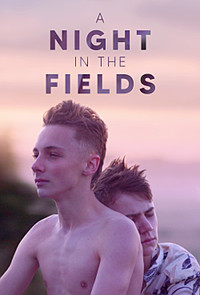 dir-scr Guillaume Grelardon prd Rafael Andrea Soatto with Felix Lefebvre, Jeremy Gillet, Nadia Tereszkiewicz, Yoann Zimmer, Alice Carel, Sandrine Salyeres, Jitka Grekova, Elisa Delorme, Yoann Jouneau, Samuel Judes, Jean-Francois Lenogue, Stephen Scardicchio release Fr Jan.20 cfsff, UK 21.Feb.22 20/France 56m Is it streaming? |
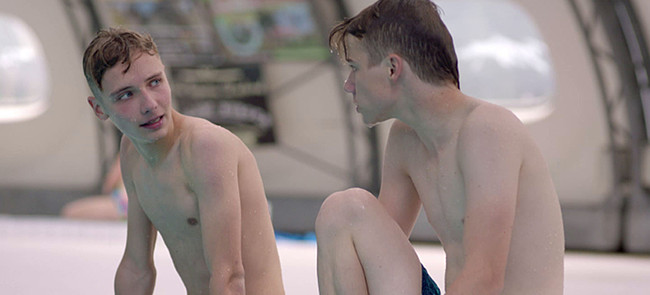 Youthful energy infuses this short feature, which is sharply observed by writer-director Guillaume Grelardon as an overnight odyssey that stirs in both edgy comedy and very dark drama. The film is an exploration of contrasts in the coming-of-age of two young teen boys, each of whom is grappling with personal issues he can't yet understand. So along the way, there are moments that are hilarious and also terrifying. At school, thoughtful 14-year-old Anthony (Gillet) gets the attention of the girl he likes, Oceane (Tereszkiewicz), by defending her from the pushy Pierre (Jouneau). And he hopes to meet up with her later at a dance club, which he's planning to visit with his rather too-lively best pal Dylan (Lefebvre). On the way, they stop at a park to see Oceane and her friends, loosened up by beer as well as drugs and cash Dylan stole from his dealer big brother Joe (Zimmer). Increasingly high, the club is a blur of dancing and brawling. The contrast between these friends is vividly depicted in their home lives, where Anthony quietly cares for his ill mother (Carel) and Dylan is in perpetual conflict with everyone. Together, they're an entertaining duo, balancing each other in offbeat ways as they take the long walk to the nightclub, getting so excited about what awaits them there that they stop at a roadside brothel, with unexpected results. The narrative has a superb freewheeling quality to it, bouncing along through highs and lows to create an engaging slice of life. Lefebvre brings a confident, kinetic edge to Dylan that's bracingly intense. Hinting that he's struggling with much deeper issues, he could spiral out of control at any moment, especially with Zimmer's furious Joe in hot pursuit. Alternatively, Gillet remains endearingly understated, giving Anthony a sweet charm. The way Anthony grounds Dylan is skilfully played, as he sees straight through Dylan's bravado. Anthony is also clearly nervous about women, especially being alone with Tereszkiewicz's more experienced Oceane, who knowingly takes the lead physically. Within this short running time, the story traverses a wide range of emotions, including one climactic sequence that's seriously harrowing to watch. There are much deeper suggestions about these characters woven into scenes along the way, including a clever exploration of the nature of sexuality. What lingers is the nuanced depiction of that moment when a youthful sense of immortality collides with the real world. And the final sequence offers a gorgeous sense of future possibilities.
| ||||

See also: SHADOWS FILM FESTIVAL © 2022 by Rich Cline, Shadows
on the Wall
HOME | REVIEWS | NEWS | FESTIVAL | AWARDS
| Q&A | ABOUT | TALKBACK | | ||||

